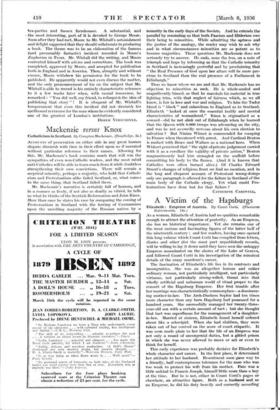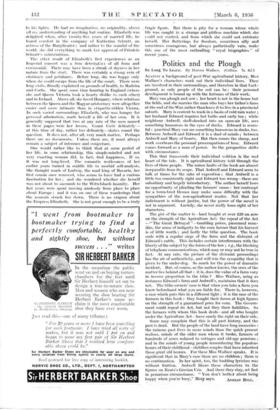A Victim of the Hapsburgs
As a woman, Elizabeth of Austria had no qualities remarkable enough to attract the attention of posterity. As an Empress, she has no historical importance. Yet she remains one of the most curious and fascinating figures of the latter half of the nineteenth century ; and few readers, having once opened this long volume which Count Corti has compiled from letters, diaries and other (for the most part unpublished) records, will be willing to lay it down until they have seen the unhappy Empress assassinated on the shores of the Lake of Geneva, and followed Count Corti in his investigation of the minutest details of the crazy murderer's career.
The fascination of Elizabeth's life lies in its -contrasts and incongruities. She was an altogether human and rather ordinary woman, not particularly intelligent, not particularly virtuous, not particularly strong-willed, thrust -into that wholly artificial and unhuman world of ritual proper to the consort of the Hapsburg Emperor. Her first, trouble after her marriage was characteristically commonplace a-domineer- ing mother-in-law. The Arch-Duchess Sophie had ten times more character than any born Hapsburg had possessed for a hundred years. She successfully managed her twenty-three- year-old son with a certain amount of tact ; but she thought that tact was superfluous for the management of a daughter- in-law. Married at sixteen, Elizabeth found herself ordered about like a schoolgirl. When she had children, they were taken out of her control on the score of court etiquette. It was soon made plain to her that the life of an Empress was not only a round of uncongenial duties, but a gilded prison in which she was never allowed to move or act or even to think for herself.
This early experience was probably decisive for Elirabeth's whole character and career. In the first place, it determined her attitude to her husband. Resentment soon gave way to a friendly, half contemptuous tolerance for the man who was too weak to protect his wife from his mother. Fate was a little unkind to Francis Joseph, himself little more than a boy at the time. But he is not, either in Count Corti's pages or elsewhere, an attractive figure: Both as a husband and as an Emperor, he did his duty heavily and correctly according to his lights. He had no imagination, no originality, above all no, understanding of anything but routine. Elizabeth was delighted when, after twenty-five years of married life, he found comfort in the company of Katherina Sehratt, an actress of the Burgtheater ; and rather to the scandal of the world, she did everything to mark her approval of Fraulein Sch ratt's ministrations. The other result of Elizabeth's first experiences as an Imperial consort was a firm detestation of all form and ceremonial. There may have been a streak of shyness in her nature from the start. There was certainly a strong vein of obstinacy and petulance. Before long, she was happy only when she could escape from the life of the court. ' There were long visits, flimsily explained on grounds of health, to Madeira and Corfu. She spent some time hunting in England (where she and Queen Victoria took a hearty dislike to each other) and in Ireland. Above all, she loved Hungary, where relations between the Queen and the Magyar aristocracy were altogether easier and more intimate than in etiquette-ridden Vienna. In such varied surroundings Elizabeth, who was hungry • for personal admiration, made herself a life of her own. It is generally supposed. that two at any rate of the men named in these pages: were her lovers. Count Corti delicately— at this time of day, rather .too delicately—skates round the question. It does not, after all, very much matter. Perhaps there are no documents. Unless there arc, it must always remain a subject of inference and conjecture.
One would rather like to think that at some period of her life, in some relationship, this simple-minded and not very exacting woman did, in fact, find happiness. _ If so, it was not long-lived. The romantic restlessness of her earlier years turned in middle life to morbid self-analysis. She thought much of Ludwig, the mad king of Bavaria, her first cousin once removed, who seems to have had a curious fascination for her ; and she wondered whether she herself was not about to succumb to the Wittelsbach insanity. Her last years were spent moving aimlessly from place to place about Europe ; and it was on one of these wanderings that the assassin struck her down. There is no enigma about the Empress Elizabeth. She is not great enough to be a truly
_tragic figure. But there is pity for a woman whose whole life was caught in a strange and pitiless machine which she could not control, and from which she could not extricate herself. Her flutterings for freedom, sometimes silly and sometimes courageous, but always pathetically vain, make this one of the most enthralling " royal biographies " of recent years.

















































 Previous page
Previous page